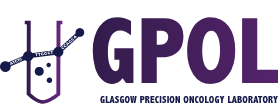Channels
Special Offers & Promotions
New Glasgow Cancer Tests for research and clinical trials
The Glasgow Precision Oncology Laboratory (GPOL) at the University of Glasgow has developed a ground-breaking new cancer test for research and clinical trials that could ultimately change the way cancer medicine is delivered.
The Glasgow Cancer Tests are a suite of affordable solid tumour and blood cancer tests, developed specifically to enable patients to benefit from real-world precision medicine-based cancer treatments.
The Glasgow Precision Oncology Laboratory will host a Q&A at the National Cancer Research Institute (NCRI) Conference in Glasgow where metastatic cancer patient, Lesley Stephen, will ask Professor Andrew Biankin about the Glasgow Cancer Assays and how they will assist patients like her to find appropriate clinical trials. Lesley Stephen and Glasgow Cancer Test researchers are available for media interview on request.
The Glasgow Cancer Tests are designed to be used in routine healthcare, such as the NHS, around the world, to enable doctors to offer the latest treatments and trials to cancer patients. These tests will also help scientists discover what makes cancer resistant to chemotherapy drugs, as well as provide data that will aid the development of new treatments.
The Glasgow Cancer Tests are currently being evaluated by NHS labs in England and Scotland. The tests are also being used in the University of Glasgow-led Precision-Panc clinical trials programme for patients with pancreatic cancer.
Professor Andrew Biankin, Regius Professor of Surgery at the University of Glasgow and Director of the Glasgow Precision Oncology Laboratory (GPOL), said: “The Glasgow Cancer Tests were created so that ultimately every patient with cancer could have access to the latest treatments and clinical trials. Our team of inventors, including Susie Cooke, Philip Beer and David Chang, have dedicated the last five years of their lives to creating the Glasgow Cancer test.
“This test will enable patients around the world to access the best treatments for their cancer. I’m extremely proud of what the team have done and where this might take us for healthcare in the future.”
The Glasgow Cancer Tests can be used for any cancer and will provide more information to understand what is driving a patient’s cancer, and therefore which drugs would be best to trial for that patient. This will give patients better access to new treatments and trials based on the genetic makeup of their disease.
The Glasgow Cancer Tests analyse the genetic code from a sample of a patient’s cancer, to look for biological markers that indicate which trial drugs would work and which would not. The tests can also check for certain changes in the patient’s genes that may explain why the cancer developed in the first place.
Dr Susie Cooke, Head of Medical Genomics at the Glasgow Precision Oncology Laboratory, University of Glasgow, said: “The challenge has been to work out how to extract the maximum amount of information about a cancer sample from a small, affordable assay and a small amount of sample material. It’s vital to have a test that provides what the patient and physician need in the real world, rather than one that has requirements that are unlikely to be met in day-to-day healthcare.
“The test also needs to cover the full range of information present in a cancer’s DNA, so that every option can be explored for every patient. We want to make it much easier for patients to get onto clinical trials and for companies to run more trials and offer more trial options to patients. The Glasgow Cancer Tests can enable that.”
More information
Over the past five years, GPOL scientists have found that we already know around 95% of what kind of genomic changes drive the development of cancers.
As the available cancer tests have evolved over time in different places around the world, alongside technological advances, they haven’t captured this information as a whole. So now the GPOL team have created a new test that not only covers what is already known about cancers, but also allows for new information to be processed.
The Glasgow Cancer Tests are unique because they both cover all the known possibilities for the genomic drivers of cancer, and are affordable to use in routine healthcare systems, such as the NHS. Some genomic tests can be very expensive and need carefully prepared samples to work effectively. The Glasgow Cancer Test requires no special preparation and is designed to be cost-effective and affordable for public healthcare providers. There is now significant interest in the Glasgow Cancer Test from both health services and diagnostic companies around the world.
Media Partners



